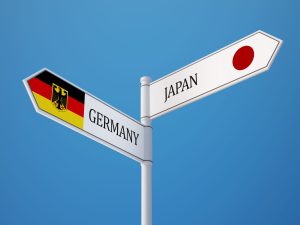Early November saw an increased German presence in Indo-Pacific security issues. On November 1, Japanese Prime Minister Kishida Fumio and German President Frank-Walter Steinmeier met in Tokyo, and on November 3, Japan and Germany held a hybrid “2+2” meeting. On November 4, German Chancellor Olaf Scholz arrived in Beijing for meetings with the Chinese leadership.
At the Kishida-Steinmeier meeting, the two leaders pledged to maintain close coordination in their response to Russia’s invasion of Ukraine, including sanctions – though Japan and Germany still import Russian energy, including natural gas. In addition, the two leaders also discussed their shared vision of a free and open Indo-Pacific and agreed that Europe’s security is inseparable from Asia’s. Though Steinmeier’s role as president is largely ceremonial, the meeting still had symbolic significance. It also set the stage nicely for more substantive talks to follow in two days.
The hybrid “2+2” meeting was attended by Japanese Foreign Minister Hayashi Yoshimasa and German Foreign Minister Annalena Baerbock in person in Munster, Germany, and virtually by Japanese Defense Minister Hamada Yasukazu and German Defense Minister Christine Lambrecht. The key takeaway from this meeting was the start of negotiations for a military pact for the exchange of supplies and logistical support. Japan already has similar agreements, i.e., an Acquisition and Cross-Servicing Agreement, with the United States, Great Britain, Australia, and India. It covers the exchange of supplies such as food, fuel, and ammunition. Such agreements help ensure smoother execution of joint exercises and disaster rescue operations.
The negotiations for ACSA are driven by shared concerns about China and North Korea. Germany and Japan reaffirmed their opposition to any unilateral attempts to change the status quo by force in East and South China Seas, and their “serious concern” about Pyongyang’s frequent ballistic missile launches. They also touched on the need to resolve the issue of abductions of Japanese citizens by North Korea, a key issue for Tokyo. Russia’s invasion of Ukraine was also mentioned as an example of how European and Asian security were inseparable.
Another takeaway was the commitment to hold “2+2” meetings more regularly, ideally, to hold them annually. This was the second “2+2” meeting between Japan and Germany, with the first being held in April 2021.
These November meetings come on the heels of slowly but steadily increasing political and defense cooperation. A German frigate made a port call to Japan in November 2021 for the first time in 20 years, and Germany sent three Eurofighter jets to Japan for the first time this past September. This past April, Scholz chose Japan for his first Asia visit.
However, at around the same time as Steinmeier, Baerbock, and Lambrecht were encouraging greater defense ties with Japan, Scholz was in China promoting greater economic ties. The economic nature of this visit was highlighted by who else came along: industry titans, including CEOs of Volkswagen, Deutsche Bank, Siemens, and BASF. A major objective of Scholz’s would be to secure market access. There were many grounds on which to critique his visit, including the perception that Scholz was supporting Xi Jinping after the 20th Party Congress at which Xi consolidated his status as the core of the Communist Party, and ongoing concerns about China’s treatment of the Uyghur peoples in Xinjiang.
Scholz’s visit was the first to China by a leader of a G-7 country in three years, and also showed that there was still some room for agreement. For example, both Xi and Scholz condemned nuclear threats and expressed a desire for an end to the war in Ukraine, though Xi did not criticize Russia or call for the withdrawal of Russian troops. Other topics of discussion on which hopefully a mutually agreeable compromise could be found include the climate crisis and global hunger.
Germany needs both Japan and China – Chinese markets for its continued economic growth, and Japanese security cooperation to oppose China’s more assertive and destabilizing actions. As Japan also needs China for economic growth, there are still opportunities for Japan and Germany to cooperate, as long as they maintain coordination and mutual trust – and the continuation of the “2+2” meetings should hopefully encourage that.

































